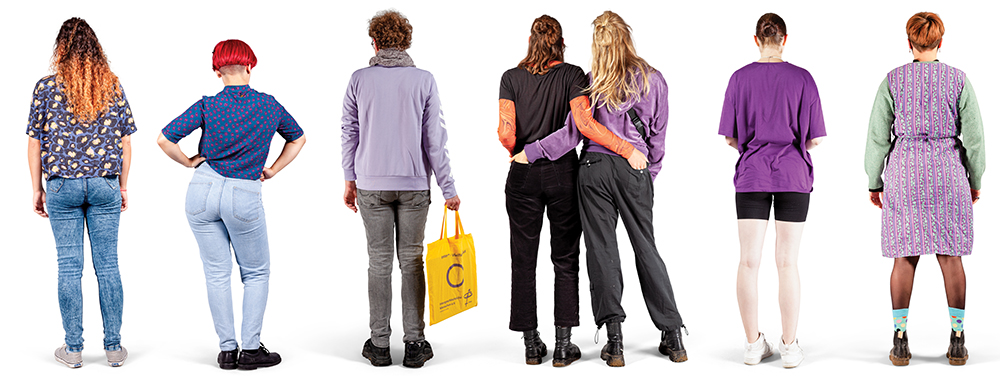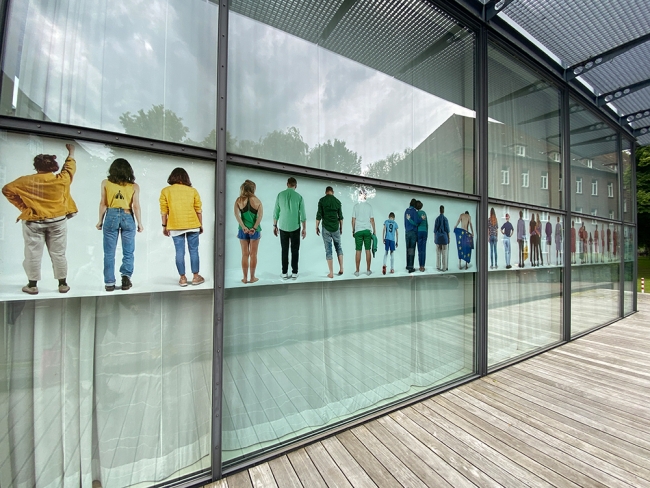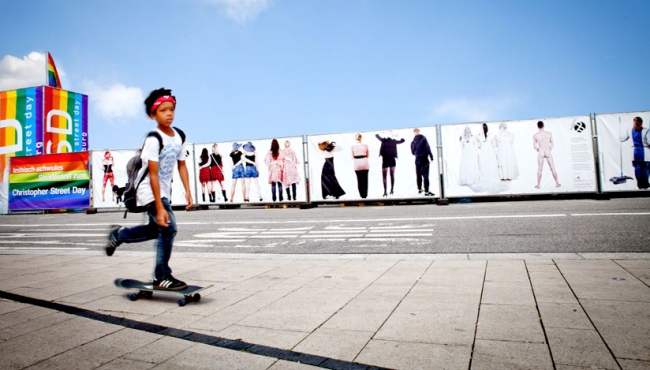Info
ANDERSRUMportrait®
is an intersectional queer feminist art campaign, pro diversity, pro acceptance and anti hate crime against LGBIATQ+


With more than 4,200 portraits - all taken from behind - this international art project is unique. Queer activist artist and gender researcher Alexa Seewald has been taking portraits of people from behind since 2010. Each portrait is an individual statement in favour of diversity and against discrimination. The purpose behind ANDERSRUMportrait®: to stand up for diversity and against stigma, against stereotypical thinking and against any kind of intersectional discrimination like racism, ageism, ableism, sexism, heterosexism etc.
To be „andersrum“ is German slang for being queer, but literally translates as being „the other way.“ This is the inspiration behind the „direction“ of Seewald‘s photo subjects. The photographer - in the literal sense - turns her photo subject around. For decades „andersrum“ has been a synonym for the pigeonholing of the heteronormative majority, upon the non-heterosexual lifestyle. Alexa Seewald uses the word „andersrum“ as title and theme in her art project. She follows the tradition of political minority movements, transforming stigmatized labels in an ironic, appreciative self-designation. The biggest highlight of ANDERSRUMportrait® so far has been its participation in the critical art ensemble of dOCUMENTA (13), the world‘s most important series of contemporary art exhibitions held every five years in Kassel, Germany.
But ANDERSRUMportrait® is not only an art project: ANDERSRUMportrait® is political. ANDERSRUMportrait® is activist because it is part of the LGBIATQ+ community. This art campaign lives from participation: People who take part in the photo shoot, people who stay in touch with the project through social media over the years, all those who actively help to realise the art actions... they are all part of a community that stands for diversity, acceptance, against discrimination and for an inclusive society. Seewald‘s photographic art is activist. For 15 years she has been fighting for LGBIATQ+ rights. This art project is independent and non-profit. ANDERSRUMportrait® exhibitions are always free of charge and accessible in public spaces.
To ensure that ANDERSRUMportrait® can continue to organize exhibitions and events, there is an appeal for donations via the website or Instagram. You are also welcome to join the team to help set up and dismantle exhibitions, assist with photography and especially with image editing.
Interviews and blurbs
A response to the exposition in the State Parliament of Brandenburg (April-June 2012):
[...] For decades "Andersrum" has been a synonym for the pigeonholing of the hetero-normative majority, upon the non-heterosexual lifestyle. Alexa Seewald uses the word "andersrum" as title and theme in her project against homophobia. She follows the tradition of the homosexual movement, transforming stigmatized labels in an ironic, appreciative self-designation. The photographer – in the literal sense – turns her photo subject around. [...]
Interview published in "escape", the lesbian magazine of Hamburg (March 2011):
Both heterosexuals and queers alike are subject to thinking within certain stereotypes, that are strongholds of queer identification (such as what we think of when we talk about "gay-dar.") This can be personified in a limp wrist and a lisp for men, and short haircuts with flannel and Birkenstocks for women.The fact that a photograph of a fashionably-dressed girl in miniskirt elicits responses like, "It looks like anything but a lesbian," shows the cultural strength of the stereotype.
Alexa Seewald asks back: "What do lesbians have to look like? [...] Who or what determines how a person should look and, more importantly, how does someone think they have the right to make these determinations " In many pictures you cannot tell whether the subject is a man or a woman. Or the gender is not questioned, because the subject might be easily misidentified as male or female. It is in this questioning, and inability to properly “identify” a person that the project is able to affectively fight stereotyping, and shed light on the true diversity of the queer community.
Interview with Alexa Seewald, "Süddeutsche Zeitung" online (May, 24th 2012):
[...]
Don't we need stereotypes to a certain extent in order to identify ourselves?
Of course. Stereotyped thinking helps us to orient ourselves and function in daily life. However, it becomes dangerous the moment we stop scrutinizing our thought patterns, their influence on our actions and the well being of others. This process should be dynamic. It makes me think of Max Frisch, who said "he moment you have a fixed picture of somebody, you have stopped loving that person.“
Do you think that homophobia is still a topic in Germany?
I know quite a lot of homosexual people who still lead a double life even though they live in a cosmopolitan city like Hamburg. I think this issue comes from something larger than homophobia per se. Living in a culture with a gender dichotomy and hetero-normative bias might also play a part.
A lot of people in your photographs decide to be photographed spontaneously at festivals. Is this aspect important to your work?
There are some people who approach me with specific ideas about wardrobes that they would like to wear at shootings. Most people, however, decide spontaneously to have their picture taken. I build up my photo collection at big events that are important to the community and try to get people excited to participate in the project – on the spot. This allows me to capture the authenticity and spontaneity of the people.
I like to mix the qualities of stylized studio photography with this spontaneity of subject and the moment. On my photos I want to keep visible and accepted all the details of the body and the clothes, regardless of whether or not it applies to the prevalent ideal of beauty. Quite often it is these details that make the photograph special and endearing.
Would regular portraits have been too common? Was that the only reason?
No. Even though the impetus was to photograph people who are „andersrum“ („the other way round“, i.e. queer), I realized quite quickly that it was a good method to question stereotypes and clichés.
What are your plans for the future?
I strive for a continuous project grant that enables me to expand the internet platform to an interactive forum and still be able to go on tour doing German wide photo shoots and public exhibitions – such as: the Brandenburger Tor, the Jungfernstieg or at the town hall in Hamburg. I also plan to make
ANDERSRUMportraits available to aide queer education programs at schools. I would also like to introduce the project to countries with actively homophobic legislation.
[...]
Favorite notes from the guestbook!
„A wonderful project - anonymous but still very personal“(Jackeline, Berlin 2011)
„This project is art - embodied“ (Walther, Karlsruhe 2011)
„I especially like how affectionately people are portrayed. You accept and like the people in your photographs just as they are. This claim is quite universal – but so far I have never seen it as truthfully implemented as it is revealed in your photographs.“ (Sister Suzette Alouette Melissa Lux Alba O.S.P.I., Potsdam 2012)
„Incredibly spontaneous and flexible, moreover imaginative and kind...! (S.W. at 'Lesbenfrühligstreffen',
Hamburg 2010)
„Can I have a look? Oh, that is beautiful: I look masculine!“ (mhc 2010)

